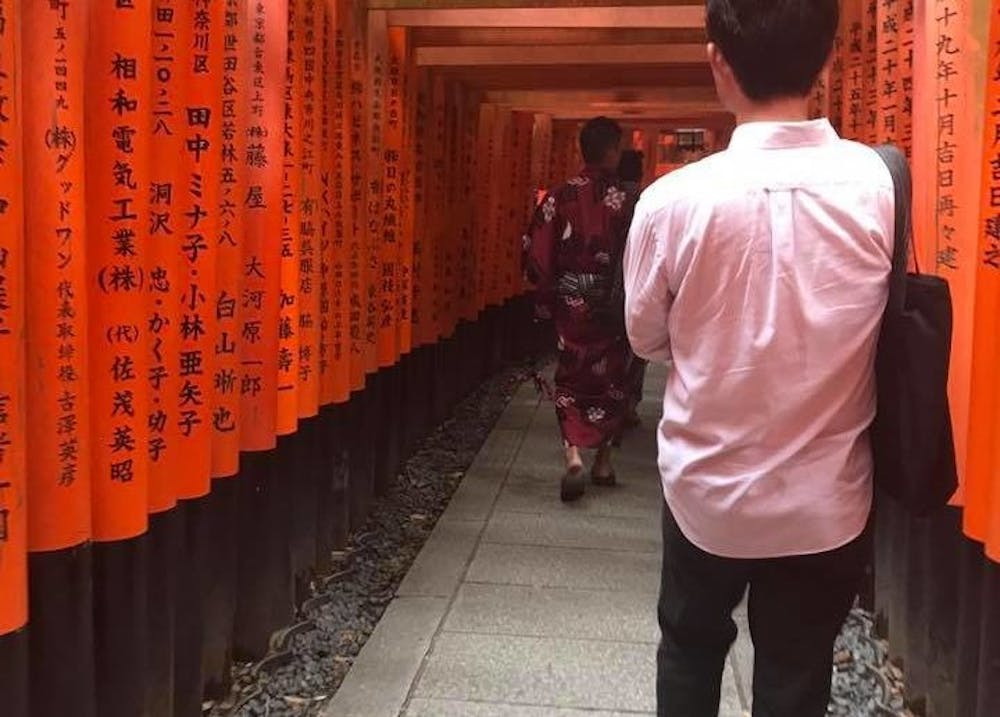I think it’s safe to say most of us have gone through a “Japan” phase at some point in our lives. Mine hit around middle school when I would carry a literal Death Note replica around, as edgy emo kids do.

Image from WikiHow’s “How to Avoid Becoming a Weeaboo“
For those uninitiated to the world of anime, there is a term for this behavior. A weeb (or weeabo) is a non-Japanese fan of Japanese content (primarily games, manga, and anime) whose love for the work often results in heated online arguments, strange character relationship matchmaking (known as “shipping”), the use of scattered Japanese words such as “kawaii” and “sugoi” (often spelled wrong, of course), cheap cosplay, or even borderline obsession. So basically these people are infatuated with Japan without really taking into account the problems faced in the country, cultural insensitivity, and the rampant over-romanticizing of Japan as a whole. Being called a weeaboo is far from a compliment, but most young anime fans go through that cringey stage when developing their love for anime.
Luckily most of us grown out of the weeaboo phase and can enjoy Japanese content without causing the entire nation of Japan to collectively craft a restraining order. I can proudly say that I love Japanese film and television without threatening other girls who show interest in the same male characters I admire.

Image from Kiss Him, Not Me!
Personally, I find myself far more interested in Japanese language and culture now than in anime or manga. While I still consume a variety of Japanese media, I typically look for cultural and social commentary and try to apply my knowledge of film theory to an international medium.
To further my knowledge of the Japanese language and culture, I decided to take a risk and study abroad in Japan this past summer. While Japan is characterized by its cuteness and generally accepting attitude towards foreign travelers, the prospect of temporarily living in a country with no friends, colleagues, or prior experience with traveling abroad made me feel relatively uneasy. Exploring a new country with different morals, values, and societal expectations can easily result in disaster for an intrepid traveler, and I did not want to be that traveler. Furthermore, my program’s requirement of living with a host family for a week added more pressure to the mix. I would be expected to eat anything they served for meals, but what if they served squid? What if it was rawsquid? I would also have to participate in any activities they offered. What if I wasn’t able to keep up? Would I be able to communicate with them in Japanese? Would they like me? What if I offended them?
These are the questions that plagued me before leaving for Japan. In essence, the country most people would usually die to visit was becoming more and more terrifying the closer the day of my flight arrived.

Considering that Japan is so overly romanticized by Westerners, the idea that anyone could see Japan as anything less than a utopia of anime merchandise and cute maids may seem radical, but no place on Earth is devoid of issues and complexities. For foreigners, adapting to a new culture can be confusing. Dr. Rob Brookey, a Telecommunications professor at Ball State described one of the language oddities he experienced in Japan:
“The Japanese use English as an affectation. So you would see these stores that would say ‘Super Potato’, but no, they’re not serving potatoes; they’re electronics stores. And so that’s a bit crazy-making too when you see English words and you think they signify something only to realize they do not. They have no meaning to what they’re attached to.”
These strange differences became apparent to me after my first day in Japan, as I began to see the culture and people firsthand. That in conjunction with the culture shock most travelers face, any foreign country can become unappealing in some aspects.
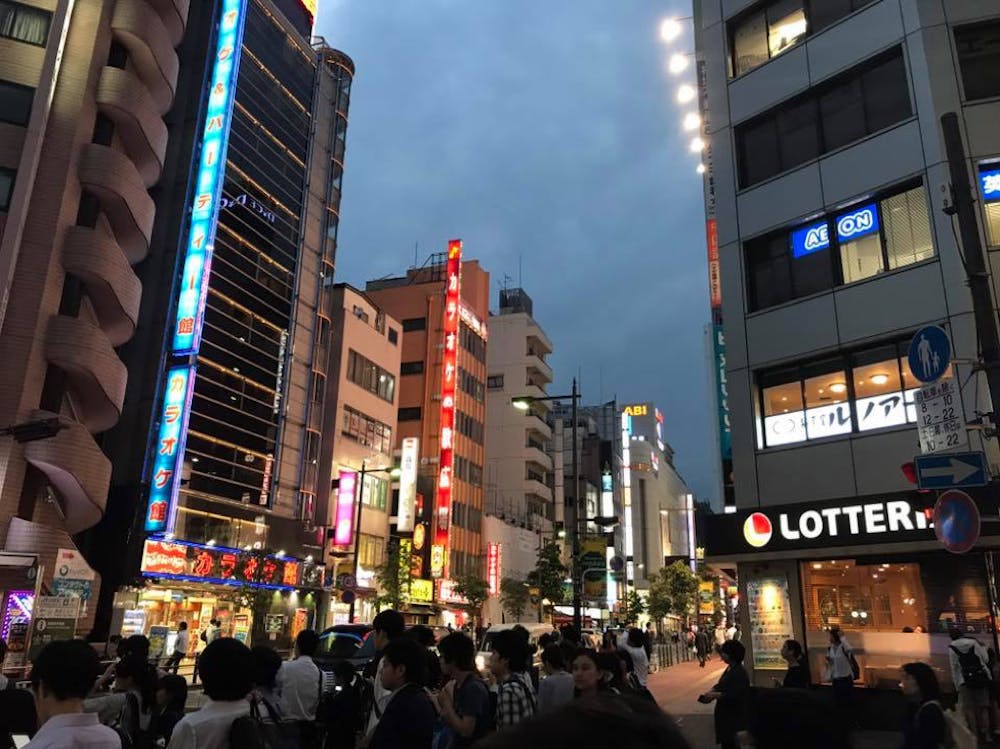
Before leaving on my one month excursion, many of my professors warned me about the culture shock I would most likely endure. Culture shock can be described as the feeling of disorientation experienced by someone who is suddenly subjected to an unfamiliar culture, way of life, or set of attitudes. Essentially those studying abroad or traveling for more than a week or so are likely to go through an uneasy transitional period within a new culture.
Culture shock is characterized by a series of phases: The initial Honeymoon Stage, the Frustration Stage, the Adjustment Stage, and finally the Acceptance Stage. During each of these phases, an individual will experience various emotions, some positive and some negative.
The Honeymoon Phase
The Honeymoon Stage is pretty self explanatory; During this stage a traveler is likely to be infatuated with every aspect of the new culture. During this time, most foreigners are more unlikely to notice any societal issues or general dislike.
Strangely, I did not experience too much of this aspect of culture shock during my trip. While I certainly loved a large portion of what I was doing and seeing in Japan, I would not say I was “infatuated”. Don’t get me wrong; Japan is a beautiful country, and I had a fabulous time, but I never wanted to uproot my American life in exchange for the Tokyo dream. To me, Japan is a country just like any other; it has its charms and its faults.
For example, the first aspect of Japan that bothered me was the lack of public seating. The Japanese lifestyle requires almost constant walking, yet there is no place to rest for the general public. Additionally, there is a lack of trashcans, meaning pedestrians have to carry waste with them for long periods of time. These aspects of Japan greatly annoyed me, and while they certainly are what I would call minor issues foreigners have to adjust to, I still felt negatively about them, even right after I had arrived.
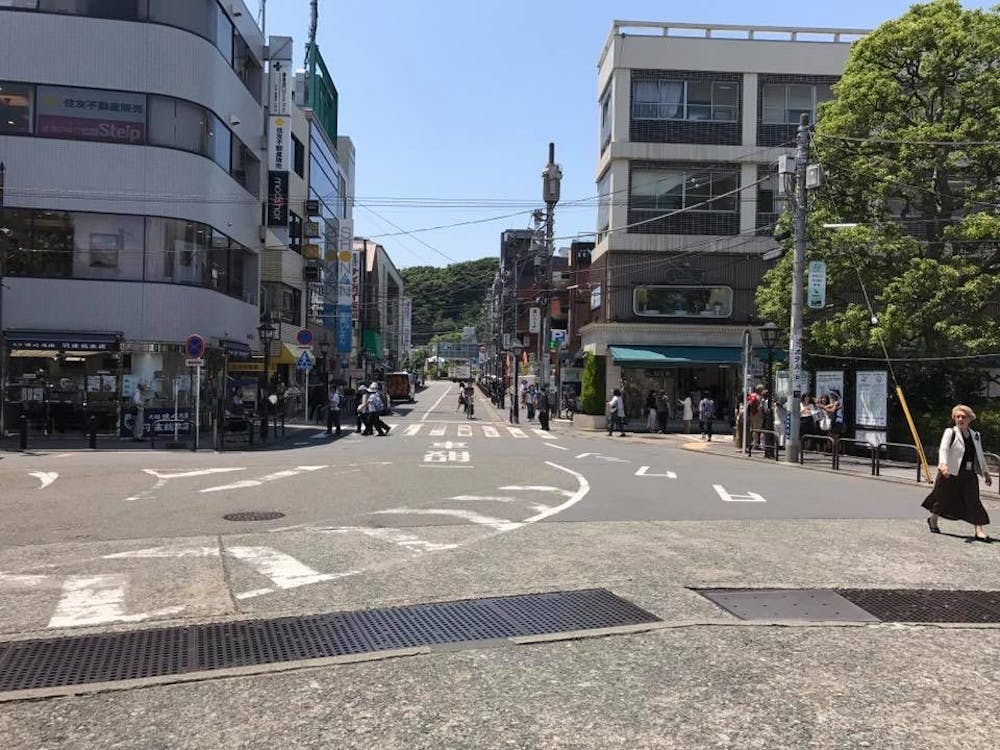
However, The Honeymoon Stage did affect other students on the trip. Noah Ashlock, a student at the University of Kentucky mentioned that because he had never left the United States before the trip, he viewed Japan as a sort of Wonderland, “I was excited by everything I saw, anything from a street lamp that looked different to the cars driving on the opposite side of the road.”

Going through the Honeymoon Phase is not necessarily positive or negative. The experience is completely reliant on the person. The fact Noah viewed Japan so positively is not at all a bad thing; he had a great time. I loved Japan, but I don’t think I initially felt as strongly as Noah, and that’s okay too!
The Frustration Stage
I personally skipped right to the Frustration Stage before I started to really love the different environment I was in. To be clear, I never hated Japan, but adjusting was slightly difficult for me. Like the trashcan example I mentioned above, I couldn’t help but dwell on minor inconveniences and negative experiences.
My friend, Dionysus Yearout (Dio for short), a student from Berea College, faced the same issue. When asked about the Frustration Stage they stated that their “initial frustration stage stemmed from my lack of communications skills and lack of time to complete all my tasks.”
The other student I interviewed was my roommate for the trip, Ball State student Ericka Lange. When interviewed, she mentioned that she was irritated with the lack of sitting accommodations, “ There are practically no places to sit outside. It was difficult to find places to sit when doing homework, unless I went back to the hotel.”
Dio brings up an interesting point. The program I was in specifically had a major impact on my frustration as a whole. My language class had a group of us stranded in our hotel rooms for hours at a time trying to grasp the fast-paced lesson plans thrown our way each day. Ericka adds that “the stress of homework while in a foreign country caused me to become frustrated.”
This is an understatement. There were nights where we would have hours of written work on top of a day of climbing mountains, mile-long treks, shrine visits, teaching lesson plans to Japanese children, going to classes, and trying to explore the culture. For students studying abroad, the program itself obviously seems to have a huge impact on the Frustration Stage.

Besides minor gripes and program woes, Dio brings up the issue of communication which caused major concerns for all of us at first, even those who have been studying Japanese language and culture for years. Just as Dr. Brookey detailed in his experience, Japanese is vastly different from English, which makes traveling and communication often confusing.
Noah also faced difficulties with communication. He explains , “I started to feel a bit resentful over some of the social norms like sticking out from the crowd. I came under the impression that my presence as a foreigner made native residents uncomfortable based on a few bad interactions I had.”
I can definitely attest to negative interactions. One of our assignments required us to find and speak to Japanese people on the street. Well the problem with the assignment is that Japanese people are almost always moving. Trying to stop a businessman is nearly impossible and older citizens want nothing to do with young foreigners. In fact, an older Japanese man literally stopped me from asking for help by shoving his hand directly in my face. This was a frustrating experience to say the least.
Japan’s often ignored dark side
The worst experience I personally had occurred during what I would call my Frustration Stage. While walking down the street of Asakusa, a young man blatantly stared down my shirt with no remorse. What was more irritating than anything was that he simply didn’t care that he had made me uncomfortable.
In fact, during our trip, two other girls experienced negative male interactions, both of which were more concerning than my own.
This breaches the subject of the rampant sexism in Japan. I began to notice the woman only trains made to protect women from molestation, the conservative gender roles in my host family’s household, the societal expectations placed on women, and I became somewhat disillusioned with the country. I was concerned with the young looking women in maid outfits being oogled at by old men and the child pop idols who danced in tiny skirts. Coming from America which is experiencing a huge feminist movement made this darker part of Japan hard for me to swallow.
The Adjustment Stage
Luckily, the Frustration Stage does pass. While foreigners will always be off put by new environments and customs, you do begin to get used to the new country and accept the positive and negative aspects.
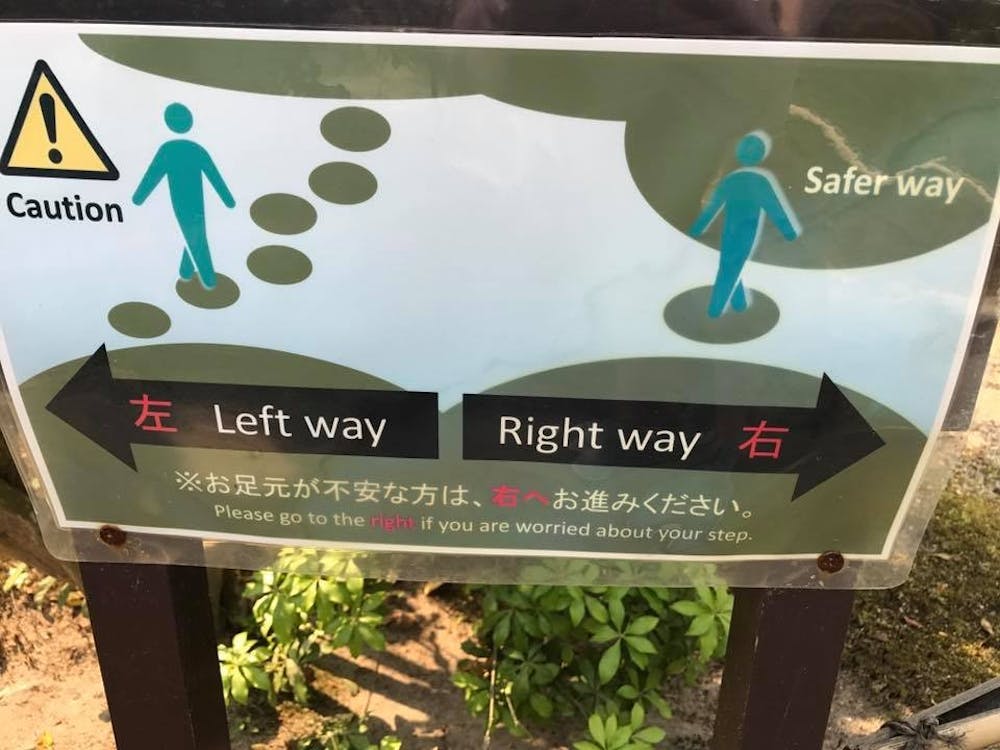
This is what is known as the Adjustment Stage.
Our program lasted a little around a month. Typically, the time it takes for this stage to set in can range between weeks and months, so we had just barely got to experience this stage. Dio mentions that they didn’t become adjusted at all due to the short time we were in Japan. However, Noah and Ericka both noticed that what had initially been shocking or confusing became less alienating to them. Noah confesses:
“As I talked to more people, I felt I hadn’t been fair to judge others based on the few early bad interactions I had. I grew more accustomed to social norms and even felt comfortable with them as my stay in Japan lengthened.”
Ericka had a similar experience, stating that she become more accustomed to the food and language as a whole. “I think I adjusted the best to the language and food the most while in Japan. Often it hardly registered that people were speaking Japanese. It just became normal.”
The Acceptance Stage
The Acceptance Stage is more complicated. Essentially, this stage marks a foreigner’s comfort in a new country. This acceptance obviously takes a long time to set-in, and as a result, it is safe to say that no one in my group fully experienced this stage. However, some students have expressed that they believe they could come to feel at home in Japan. Ericka remarks, “I think I began to understand that life in Japan is very similar to the US. Yes there were differences but those differences just made the place unique. Sometimes I just felt like I was in a different area of the US.”
So ultimately how did culture shock affect all of our experiences abroad?
While some irritations definitely arose from visiting and temporarily living in Japan, culture shock is simply a healthy part of the going abroad experience . You are bound to find things you don’t like in any country and some preconceived notions you had about the country may be untrue or exaggerated leading to a sense of betrayal. However, Noah believes that culture shock is an important experience:
“Experiencing culture shock is a good thing in my opinion. The experience made me more open minded and I feel as though I grew as a person with a new understanding of not just Japan, but outside America in general. There is a world out there that doesn’t revolve around America despite our often proud thoughts as being the center of the universe. I miss Japan and can’t wait to revisit someday.”
So is Japan amazing? Absolutely! Maybe just not in the ways media and word of mouth have expressed. Most people are very helpful to foreigners, the language is beautiful, the cities are full of adventure, and the food is to die for. The heart of Japan really does lie in the society itself. Despite a few negative social situations here and there, “almost everyone I met and talked to were so kind and polite towards me” Noah says.
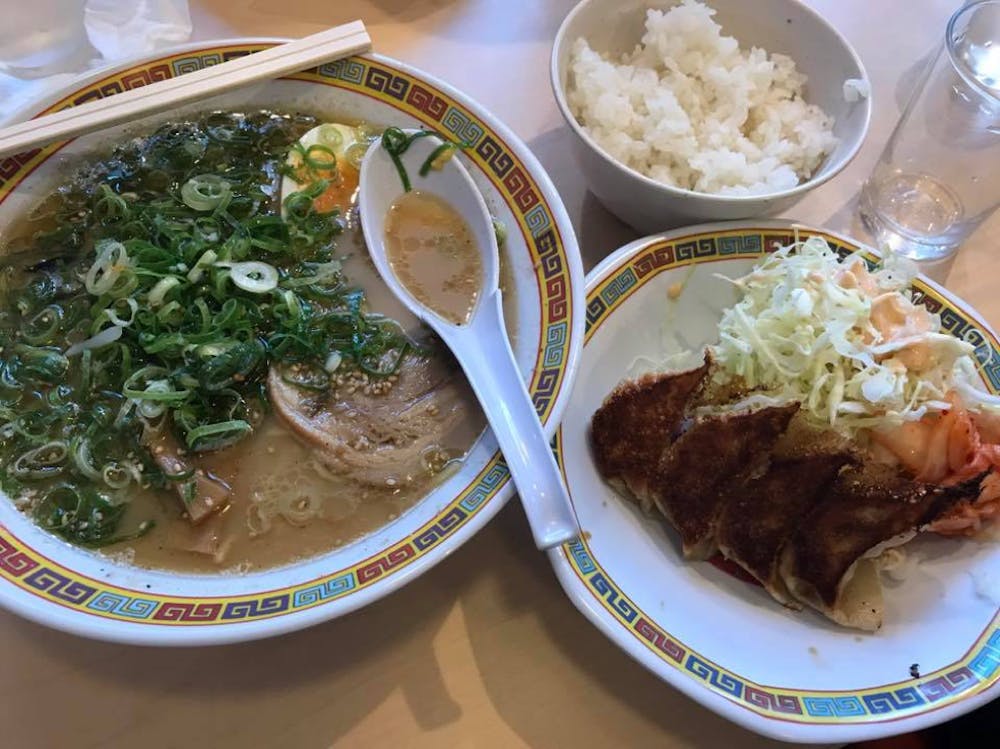
My host family went out of their way everyday to make me feel at home. When I got lost in the train station on two separate occasions, businessmen as well as a group of highschoolers jumped at the opportunity to aide me. The Japanese people tend to want to share their culture with foreigners, so as long as you act respectfully, they will go above and beyond to make your Japan experience a great one.
Fans of anime and manga should definitely make the pilgrimage, however, if you go to Japan expecting an anime paradise, you will probably be disappointed. It is a regular country just like any other with both positive and negative attributes. Japan has some major faults, and those shouldn’t be ignored just because “cute things!”
Yes, anime exists in Japan. You can buy figures and plushies to your heart’s content. There are cute cat umbrellas and costumes, girls in maid outfits, and J-Pop CDs, but going just for those things does the country a major disservice.
For students studying Japanese, going to Japan will vastly improve your reading and listening abilities. Being forced to read constant hiragana, katakana, and kanji or communicate with native speakers allows for a natural learning environment. For me, my skills increased drastically in a short time. I learned more Japanese by naturally reading and speaking it in Japan than I did in 6 months of a classroom lecture.
Even if you go with little to no knowledge of Japanese, you will come back having picked up plenty of phrases and words. Visiting Japan really is the ultimate way to hone your Japanese abilities.
The best way to experience Japan, and probably any foreign country, is to take everything in stride, respect the customs and people, and most importantly work towards accepting the country for what it is; both good and bad.
Images: WikiHow, Crunchyroll, Emily Reuben
For more entertainment related content, visit us at Byte Bsu!
















